"Miss Granny" is a Korean Gem Worth Revisiting
Also: A look at how "Tale of the Nine Tailed 1938" reflects on colonization
I wasn't expecting much the first time I watched "Miss Granny" (수상한 그녀) on a Korean Air flight. I thought it’d be fun, but nothing particularly meaningful. Not only did it turn out to be my favorite movie of 2014, but it’s become one of my all-time faves. When the Victoria & Albert Museum commissioned me to write about the history of Korean cinema for its Hallyu! The Korean Wave exhibit, I made sure that “Miss Granny” was included.
A huge hit in South Korea where it was filmed, "Miss Granny" doesn't have a particularly unique plot. But director Hwang Dong-hyuk (the mastermind behind “Squid Game”) deftly takes an old premise (an elderly woman finds herself magically transformed into a 20-year-old version of herself), adds some new twists, touches on some social commentary relevant to South Korea and creates a charming comedy full of music and scenes that will tug at your heart.
Also, I’m sharing some of my thoughts on “Tale of the Nine Tailed 1938” with a mini review. Today’s post is on the longer side — even for me! — so if you don’t have the time (or desire) to read both reviews, click on the title you are interested in reading and take it from there. I hope you find these anchor links helpful:
Miss Granny ☆☆☆☆
Tale of the Nine Tailed ☆☆☆
Tale of the Nine Tailed 1938 ☆☆☆
FWIW: The ratings are based on a ☆☆☆☆ system and simply reflect my own personal taste.
“Miss Granny” ☆☆☆☆
When we first meet Oh Mal-soon (Na Moon-hee), we see a cantankerous 70something who isn't pleasant to be around. She's horribly dismissive of her daughter-in-law and makes fun of her friends — including her long-suffering former servant, Mr. Park (Park In-hwan).
She saves her smiles and kindest words for her only child Hyun-chul (Sung Dong-il) — a well-respected professor at a top university — and she dotes on her grandson, Ji-ha (former B1A4 K-pop star Jinyoung), who is intent on becoming a musician, despite his parents' protests.
Mal-soon has a frenemy — a slightly younger woman at the senior center who flirts with Mr. Park and brags about her well-off son in America (a doctor) who has sent her a plane ticket to come visit him. When this kinda-sorta friend mistakenly orders a "United States coffee" instead of an Americana, Mal-soon takes great joy in pointing out the embarrassed woman's error.
The two verbally duke it out, with the younger woman scoring the equivalent of a KO when she points out that if Mal-soon's son is so wonderful, then why does he allow her to wear torn, worn-out shoes?
Meanwhile, Hyun-chul's wife, Ae-ja, develops a heart condition that's exasperated by her mother-in-law's nonstop nitpicking. When she ends up hospitalized, Ae-ja's doctor says that if she doesn't live a life filled with less stress, Hyun-chul will end up a widower.
Hyun-chul makes the difficult decision to send his mother to a nursing home, promising her that when Ae-ja's health recovers, they will bring her back home. (Sung Dong-il does a wonderful job playing Hyun-chul. It's hard to believe he's the same man in the "Answer Me" trilogy, where he is almost always screaming and/or joking around.)
But Mal-soon suspects that won't happen.
And when she has a run-in with the daughter of a restaurant owner whose business was ruined when Mal-soon stole their best recipe, she loses all hope. As the younger woman berates and beats her, Mal-soon says, "Yes, I did that, but I did what I had to. I raised a good son who will always take care of me."
She's too proud to admit that he is sending her away.
Depressed and feeling that she has been abandoned, she goes to a photographer's studio to get her funeral portrait taken. The kindly photographer promises to make her as beautiful as her idol, Audrey Hepburn. And sure enough, when she leaves the studio, Mal-soon has been transformed into a 20-year-old beauty (now played by Shim Eun-kyung).
She reinvents herself as Oh Doo-ri (Audrey. Get it?) and rents a room at the house where Mr. Park and his daughter live. This way, she can be close enough to the home where her family resides to keep tabs on them.
Just 19 years old when the film was made, Shim Eun-kyung does a wonderful job playing Doo-ri. Feisty and adorable, she has the mannerisms of a septuagenarian down pat.
The combination of Doo-ri's beauty and frank manner of speaking makes her irresistible to a slew of men, including Mr. Park, her own grandson and a handsome TV show producer, Seung-woo, who hears her singing at the senior center.
There is a slight ick factor when Ji-ha initially flirts with her. But the way Doo-ri deals with it is hilarious, recalling to herself that his game is as clumsy as that of his grandfather — her deceased husband. Soon, the two take on a more sibling-like relationship, with Doo-ri joining Ji-ha's band and transforming it into an (almost) overnight sensation.
One of the film's cutest scenes occurs when Ji-ha writes a well-received song. Doo-ri pats him on the butt, just as a grandma would to her young grandchild. To cover up her faux pas, she then pats all the band members' rears and says it's how she celebrates. From then on, that becomes their thing. They celebrate each milestone by slapping each other's butts.
As for ↓Seung-woo (Lee Jin-Wook), Doo-ri develops feelings for him. But when he says he has never met anyone like her before and is falling for her, I sense that he finds comfort in her old soul more than anything else.
"You smell like my mother, who I can't remember," he says, after telling her that his mother died when he was a baby.
Some of the film's best moments are the musical numbers. Shim sings all her own songs and she displays a pure, lovely voice that harkens back to a time when vocalists could sing beautifully without any, erm, assistance.
In "White Butterfly," the song below, Doo-ri relives her difficult past — marrying a man who would die a year later, leaving her a widow when she was barely a bride. She would raise their infant alone, washing dishes at a restaurant outside while her baby son was tethered to a rope, so that he wouldn't wander off.
She sheds a tear at the end of the song. I will admit that when I watched this for the first time on Korean Air, I sobbed so much that other passengers looked worried for me. It wasn't just that the song told a full story, but that it's a story of unending hardship that many Koreans (and Korean diaspora) will recognize. (For more about this same era, read my review of "Ode to My Father.")
I'll discuss the ending in the Spoilers below...
Original release date: January 22, 2014. Film stills courtesy of CJ Entertainment. I rewatched this recently on Netflix in the U.S.
Running time: 124 minutes.
SPOILER ALERT: When Ji-ha is in a serious automobile accident, Oh Doo-ri does what most parents/grandparents would do: she gives up her life so that he will survive. In this case, she doesn't die, but she willingly gives up her youth to save his.
When her son realizes that Oh Mal-soon and Oh Doo-ri are the same person, Hyun-chul says he will make sure his son survives, but that now it's her time to live a happy life. He begs her to marry a man who won't die young and to have a grateful child who will treat her better than he has.
She tells him that given the chance to do it all over again, she would do it exactly the same. She is his mother and he is her family. That's basically what is being said in the scene below.
And it's a scene that never fails to make me cry.
Some might call it melodramatic, but my father said the same thing before he died — that he wouldn't have changed any of his hardships, because without them his life wouldn't have included the web of events that led to his meeting my mother and them having us.
And my mother, who led a very difficult life as the wife of the oldest son — which basically meant she became a servant to her in-laws — said the same thing: that she wouldn't have traded her life for an easier one, because then she wouldn't have had us.
There's also a flashback showing that while Mal-soon was overly critical of Ae-ja (played by actress Hwang Jung-min — not to be confused with the “Ode to My Father” male actor of the same name), she quietly showed her love and concern for her daughter-in-law in ways that were easily forgotten because of her ill temper.
The film ends with a nice surprise for K-drama fans. Kim Soo-hyun, the star of the popular series "My Love from Another Star," makes a fun cameo appearance, ensuring that Mal-soon is indeed on her way to leading a happily-ever-after life.
"Tale of the Nine Tailed" ☆☆☆
In Korean folk-lore, 구미호 — which literally translates into nine-tailed foxes — are cunning creatures who live to be about 100. As they age, they grow an extra tail. 구미호 are usually young women who seduce men to eat their livers or hearts. But in the K-drama “Tale of the Nine Tailed,” the alpha fox is Lee Yeon. Once the mountain God of Baekdudaegan, he was kicked out for a variety of reasons that revolved around his love for a human woman named Ah-eum.
The woman has been reincarnated as a modern South Korean woman and the viewers will figure it out well before Yeon does. Ji-ah is a tenacious producer at a local station who is searching for her parents, who mysteriously disappeared after a car accident when she was nine. Their bodies were never found.
Meanwhile, he has a contentious relationship with his half brother Rang, who is half human. Rang is obsessively jealous of Yeon’s search for the reincarnated Ah-eum and vows to kill him for abandoning him to search for her. But watching the two brutally fight each other, it’s also clear that neither will kill the other. Their relationship is complicated and tragic, and this is the story arc that held my interest the most.
Lee Dong-wook is a master at playing humorously morose otherworldly beings (“Goblin“). And he does more of the same here. Kim Bum (“Boys Over Flowers“) is so good at playing his younger brother that despite all of the horrible things he had done in the past (like massacring a village just because), viewers are drawn to him and feel empathy for him. (I know I always say I hate when screenwriters manipulate viewers like this, but it worked so well here.)
Midway through the series, a half man, half serpent named Imugi in the human form of an news intern named Tae-ri (coincidentally also the first name of actor Lee Tae-ri of “The Moon That Embraces the Sun” fame) enters the picture. He vows to kill Yeon and make Ji-ah his bride.
There’s a lot more to be said, but I’ll save that for the spoiler alert below.
Airdates: Sixteen 65- to 70-minute episodes airede from October 7 to December 3, 2020 on tvN. I watched this series on Viki. The second season of this series — tentatively titled “Tale of the Nine Tailed 1938” — is predicted to be released later this year or in 2024. We shall see.
Spoiler Alert: Ji-ah is the reincarnation of Ah-eum, the King of Joseon’s daughter. In order to save her father, who has been possessed by Imugi, she offers a trade. Leave the King’s body and enter hers instead.
Modern-day Imugi has been split in two: half living inside Tae-ri’s body, but the stronger half resides within Ji-ah. Tae-ri/Imugi tells her that she can live if she offers Yeon to him instead. She was willing to sacrifice herself, but Yeon had plans of his own. He swallows one of Imugi’s scales (hence starting the process for the serpent to inhabit his body) and drags Tae-ri into the river where they both will die, thereby ending Imugi’s reign of terror.
But…Yeon doesn’t die. Rang does. He makes a deal with the Lord of the Underworld to trade his life for his brother’s. Even though he committed unforgivable crimes, he is allowed to reincarnate as a little boy who has a doting mother — something he never had. And Yeon recognizes him right away.
Yeon has been reincarnated as a human male with no memories of his 구미호 past. He and Ji-ah get married.
The question on my mind was: the point of Yeon and Tae-ri/Imugi dying was to kill Imugi forever. Just as Ji-ah had Imugi in her, does Yeon still have Imugi in him?
But wait…there’s more! The last few minutes show that Yeon is not human. He’s still immortal. How? Why? And since the purported sequel will go back in time to 1938, these questions probably won’t be answered.
© 2023 JAE-HA KIM | All Rights Reserved
"Tale of the Nine Tailed 1938" — A look at colonization ☆☆☆
According to Korean folk-lore, nine-tailed foxes (구미호) are cunning creatures who live to be about 100. As they age, they grow an extra tail. 구미호 are usually young women who seduce men to eat their livers or hearts. But in the K-drama “Tale of the Nine Tailed” and its recently released prequel “Tale of the Nine Tailed 1938,” the alpha fox is a much older male protagonist named Yeon (Lee Dong-wook). Once the mountain God of Baekdudaegan, he was kicked out for sacrificing everything for a human woman. That was the thrust of the 2020 series.
In this second action-packed and swashbuckling season, Yeon and his servant/assistant Shin-joo (Hwang Hee) are sent back to the past to recover some artifacts that will have an impact on the future. All the main characters from the first season (save for Yeon's love interest Ji-ah) have prominent roles here as well. The Snail Bride (Kim Soo-jin) owns a boutique rather than a restaurant; Shin-joo's wife Yu-ri (Kim Yong-ji) is now a reporter and freedom fighter Eun-ho; King Yeomra's younger sister Taluipa (Kim Jung-nam) — who's kind of an equalizer between the living and the dead — and her henpecked husband Ui-ong (Ahn Gil-kang) are aware of which century they're in and why Yeon has been sent back to 1938. Why she didn't share this bit of info with him, though, is beyond me.
But this series is really about the camaraderie and love that Yeon has for his half brother Rang (Kim Bum), who was unwanted from birth by his human mother and his powerful but careless 구미호 father. Only Yeon tried to protect him through every era. In the first season, it took about half the series for Rang to realize that he didn’t want his brother to die. The realization comes much quicker in “1938” and in many ways serves as Rang’s redemption arc.
Honestly, even if there was no plot, I could watch Rang and Yeon banter for hours. Unlike the debut season where Rang was so despicable that I initially had a difficult time warming up to his character’s eventual change of heart, he is like a wounded puppy here. Though he doesn’t understand how and why this Rang is so much more brotherly than the man he knew, he begrudgingly accepts it.
This K-drama does a good job weaving together history along with fiction, and includes some fun meta moments. In the second episode, one of the Miss Joseon beauty contestants took the train from Busan to enter the pageant. After she wins, she turns into a yacha, or a demon that can only be satiated from human flesh and blood. Kind of like the zombies in ... "Train to Busan" and "All of Us Are Dead. " But in this case, only beautiful women make up these yacha.
"1938" isn't exactly subtle about the demonization of Imperial Japan, which colonized Korea during this period. The most frightening and brutal demons are the Japanese overlords, led by Kato Ryuhei (Ha Do-kwon of "The Penthouse" trilogy).
There is some romantic pining, but not for Yeon. He just wants to return to the modern world to see his beloved Ji-ah again. But back in 1938, his childhood friends (and fellow mountain Gods) are embroiled in unrequited love. Hong-joo (Kim So-yeon) is giddily and possessively obsessed with Yeon, while Moo-young (Ryu Kyung-soo) wants nothing more than to win Hong-joo's heart. Oh, and to revive his dead brother. (I could've done without this subplot, which dragged on and on and on.)
There are some plot inconsistencies. For instance, Yeon can move at the speed of light and attack dozens of mortals and demons without so much as getting a cut. So near the end of the show, when a series of explosives go off, why does he just stand there and wait for collateral damage instead of tossing them at Kato?
Airdates: Twelve episodes — ranging from 60- to 75-minutes each — aired from May 6 to June 11, 2023 on tvN. I watched this on Prime Video.
© 2023 JAE-HA KIM | All Rights Reserved




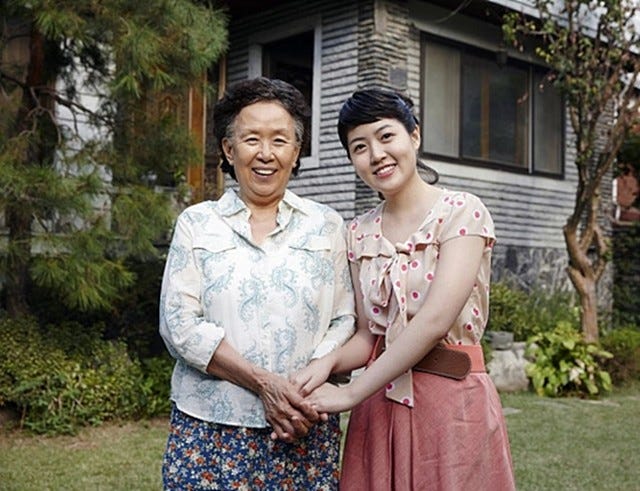
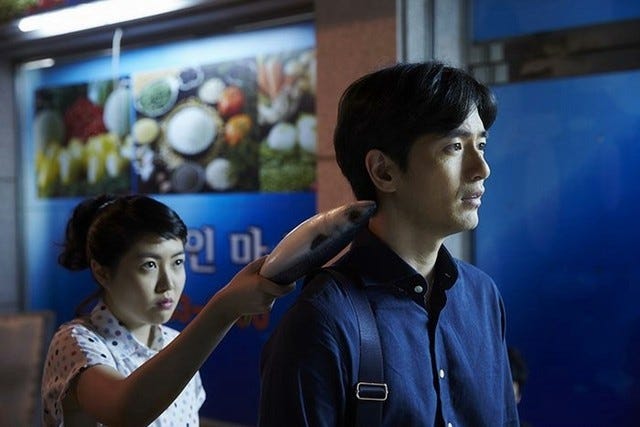
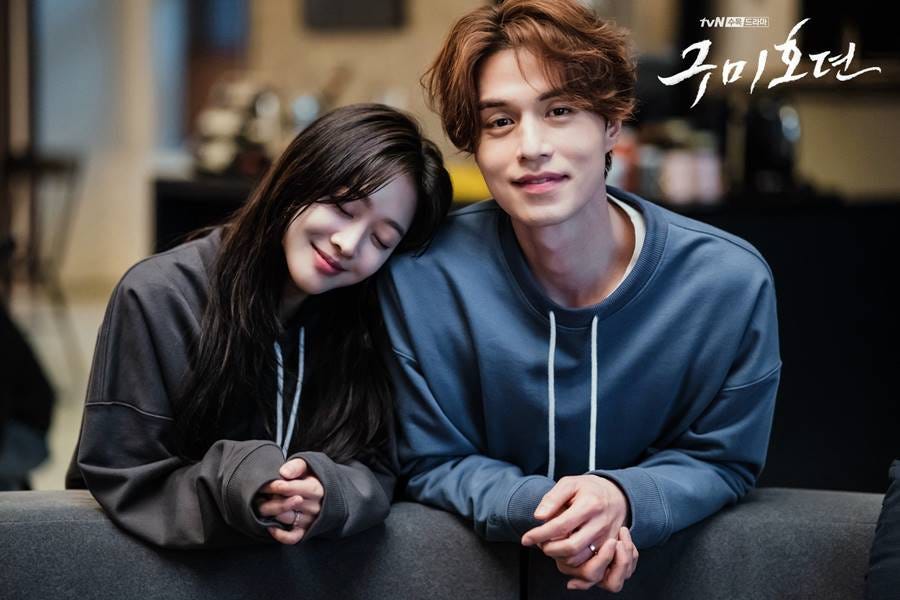
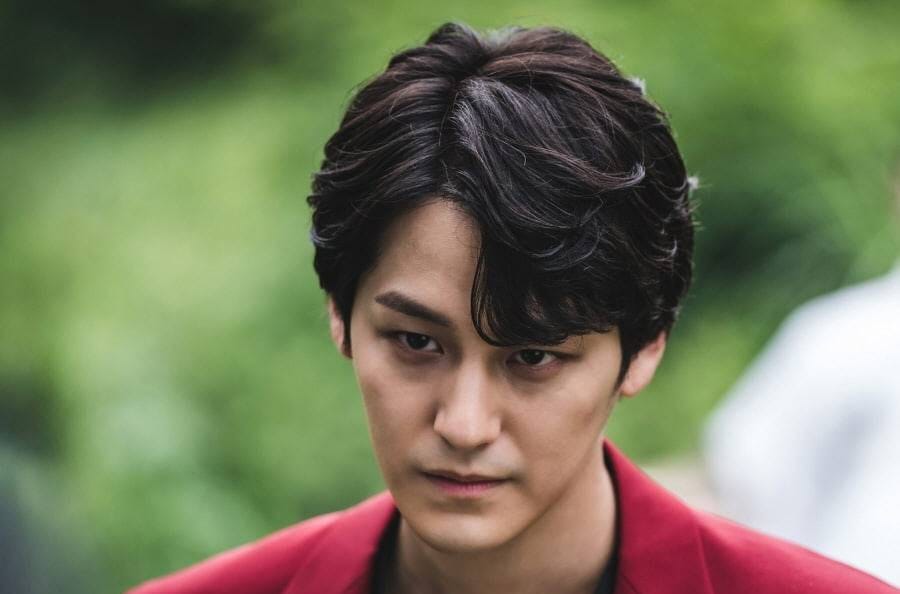
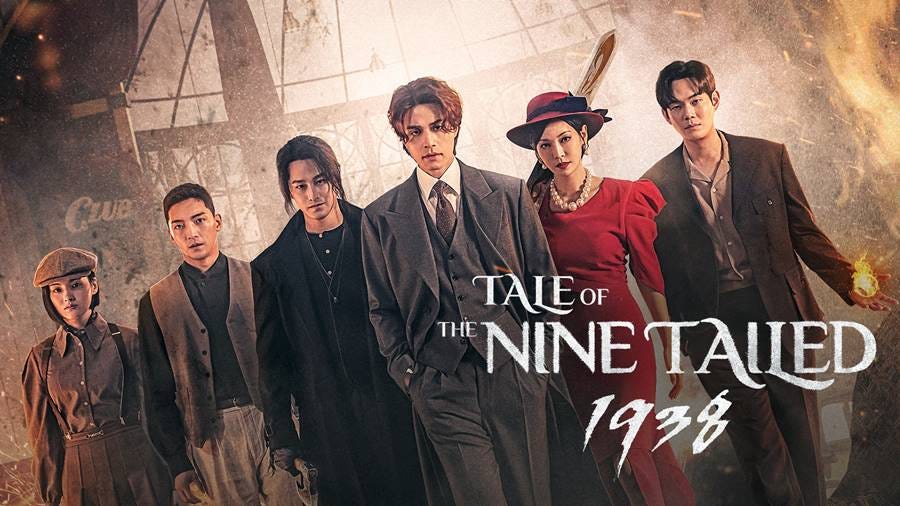
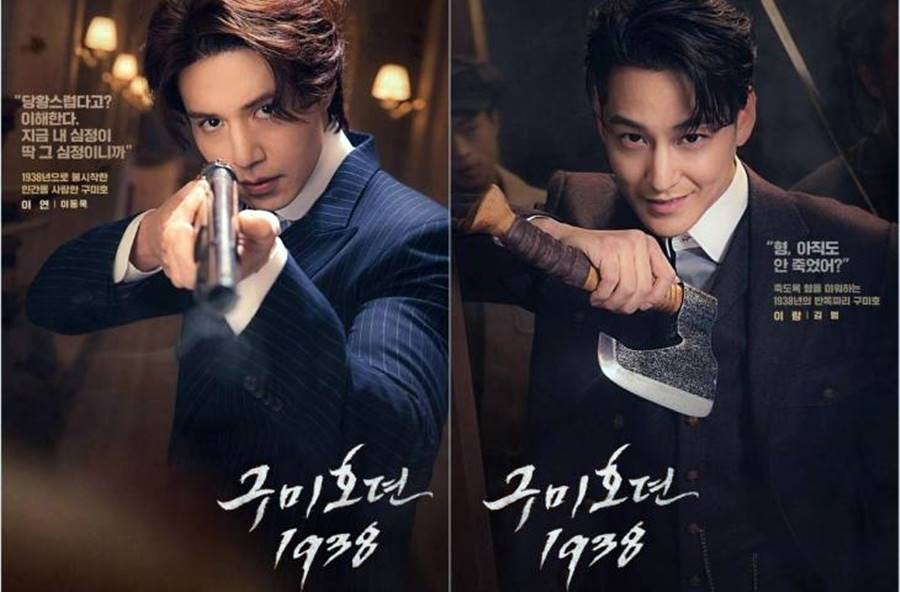
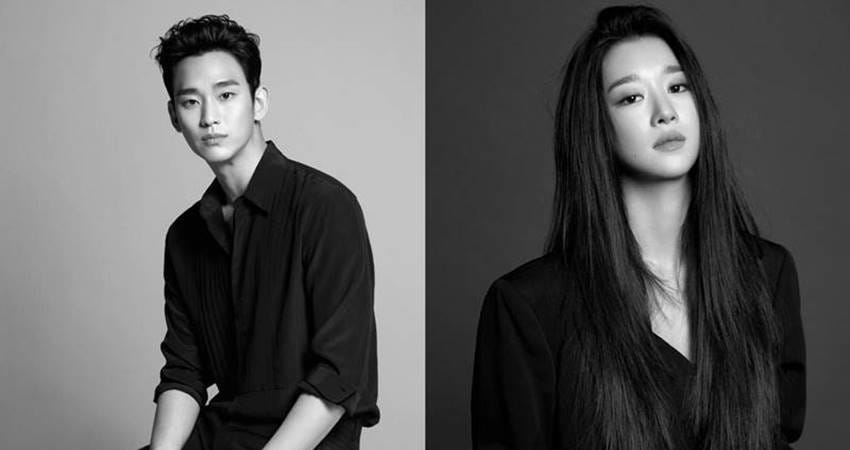
I love Miss Granny. Even with several adaptations the message of the story never fails to resonate with viewers.
I started "Miss Granny" last night. From the minute she was on the screen, I knew I had seen her in something else. It drove me crazy. This morning I woke up and the first thing that popped into my head was "My Lovely Sam-Soon"! She was Jin-heon's mom! Wow! I've just watched the first episode, but I like it already. Thanks for reviewing it, it was not on my radar. You sure can pick 'em!